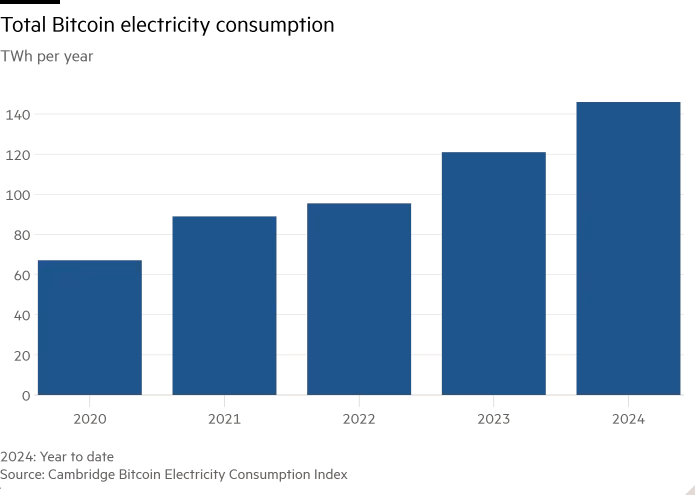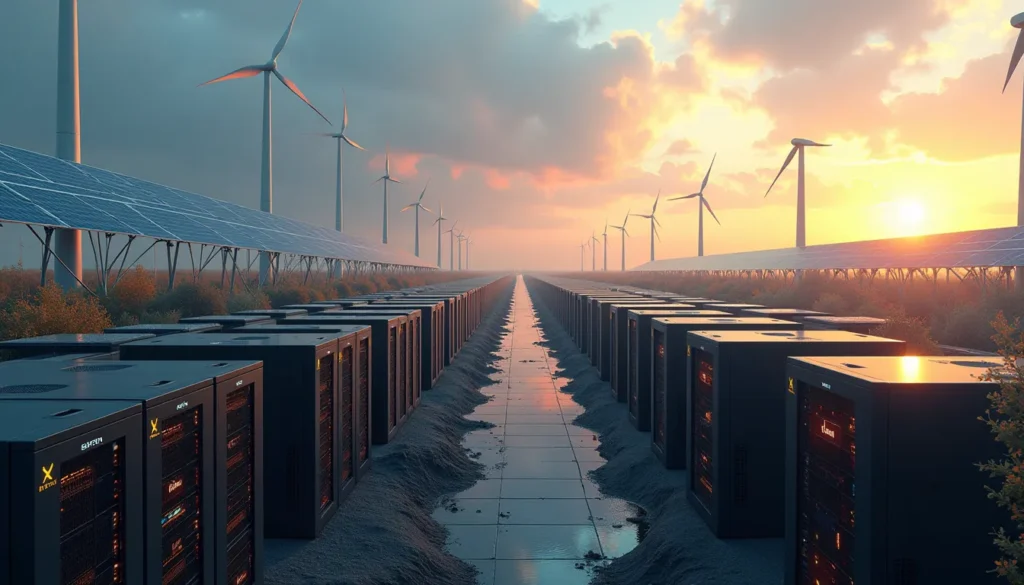The Environmental Impact of Bitcoin Mining
Whatever one thinks about the merits of bitcoin, one thing is clear: it has a significant environmental impact. Bitcoin mining, the process of validating transactions and adding them to the blockchain, is an energy-intensive endeavor that consumes vast amounts of electricity.

Energy Consumption and Carbon Footprint
According to the Cambridge Bitcoin Electricity Consumption Index, bitcoin mining has soaked up approximately 146 terawatt hours (TWh) of electricity this year, which is more than the annual electricity used by countries like Sweden.
The dominance of fossil fuel-based energy in bitcoin-mining countries exacerbates this issue. A UN study revealed that 67% of the electricity consumed for bitcoin mining in 2020-2021 was produced from fossil energy sources, with coal providing 45% of the overall electricity used globally during that period. This results in substantial greenhouse gas emissions; bitcoin mining emitted over 85.89 megatons of CO2 equivalent (MTCO2E) from 2020 to 2021, a figure comparable to the emissions of entire countries like Singapore.
Water and Land Footprints
Beyond its carbon footprint, bitcoin mining also has significant water and land impacts. The UN study highlighted that bitcoin mining activities in 76 countries have substantial water and land footprints, with countries like Norway, Sweden, Thailand, and the UK ranking high in these categories. The top 10 bitcoin-mining countries are responsible for 92-94% of the global carbon, water, and land footprints of bitcoin.
The Challenge of Sustainable Mining
From a financial standpoint, traditional bitcoin mining strategies often do not make sense when trying to adopt green methods. The high capital cost of the machines used to mine bitcoin needs to be spread out over as much production as possible. With bitcoin prices high and energy prices relatively low, it rarely makes sense to switch production off. However, some companies are exploring innovative ways to mitigate these environmental impacts.

Mara Holdings’ Green Mining Initiative
MARA Holdings, a US-listed cryptocurrency mining company, has taken a pioneering step by acquiring a wind farm in Texas. This move is part of a broader push within the crypto industry to address environmental criticisms. The wind farm, with a nameplate capacity of 114 megawatts (MW), will power a renewable energy-based crypto mining data center at what MARA describes as “zero-marginal energy cost”.
By using the wind farm’s output, MARA aims to produce bitcoin with near-zero carbon emissions. Although this approach may not be financially viable for most mining operations due to the intermittent nature of wind power, MARA’s strategy leverages old, depreciated computing equipment, which, despite being less energy-efficient, becomes cost-effective when energy costs are near zero. This initiative could set a precedent for other crypto firms to invest directly in renewable energy assets rather than relying on external power sources.
Broader Implications and Future Directions
The integration of renewable energy into bitcoin mining is not without its challenges. Wind power generation is intermittent, and companies like MARA may need to supplement their operations with battery storage or grid connectivity during periods of low wind production. However, this trend signals an opportunity for renewable energy developers to collaborate with industries looking to green their operations.
Global Context and Regulatory Pressures
The environmental impacts of bitcoin mining are gaining increased attention from regulatory bodies and environmental activists. The UN report on bitcoin mining highlights the need for regulatory interventions and technological advancements to improve the efficiency of the global financial system without harming the environment. With bitcoin’s energy requirements producing significant greenhouse gas emissions and other environmental impacts, there is a growing call for sustainable cryptomining practices.

E-Waste and Other Environmental Concerns
In addition to energy and carbon footprints, bitcoin mining also contributes to electronic waste (e-waste). The frequent cycling through of short-lived hardware could exacerbate the growth in global e-waste, posing threats such as toxic chemicals and heavy metals leaching into soils, air, and water pollution, and improper recycling.
Conclusion
As the cryptocurrency sector continues to grow, finding sustainable ways to mine bitcoin is crucial. MARA Holdings’ acquisition of a wind farm in Texas is a promising step towards reducing the environmental impact of bitcoin mining. While there are challenges to overcome, such as the intermittency of renewable energy sources and the need for supplementary power solutions, the trend towards green mining could potentially reshape the economics of crypto mining.
By investing in renewable energy sources, crypto companies can align their operations with growing global demands for sustainability. This not only helps in reducing the carbon footprint but also sets a precedent for other energy-intensive industries to adopt similar strategies. As regulatory and social pressures mount, innovations like MARA Holdings’ green mining initiative offer a hopeful path forward for a more sustainable future in the blockchain industry.
Additional Resources
- Cambridge Bitcoin Electricity Consumption Index
- Cambridge Bitcoin Electricity Consumption Index
- This index provides real-time data on the energy consumption of bitcoin mining, allowing readers to stay updated on the latest figures.
- United Nations Environment Programme Report on Bitcoin Mining
- UNEP Report on Bitcoin Mining
- This report delves into the environmental impacts of bitcoin mining, including carbon footprint, water usage, and land footprint.
- MARA Holdings Official Website
- MARA Holdings
- The official website of MARA Holdings provides more information about their green mining initiatives and other projects.
- Aurora Energy Research
- Aurora Energy Research
- Aurora Energy Research offers insights into the energy efficiency of bitcoin-mining equipment and the financial implications of different mining strategies.
- Blockchain.com Blog
- Blockchain.com Blog
- This blog provides a variety of articles on blockchain technology, cryptocurrency trends, and sustainable mining practices.
